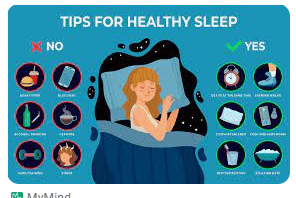
A Quality good night sleep, like eating nutritious food, drinking water, and exercising regularly, is important for overall health. Although the exact reasons for the requirement of sleep for humans are unknown, sleep experts agree there are numerous advantages to getting a full night’s rest continuously. Most adults should get between seven and nine hours of sleep per night.
The body repairs and maintains nearly every part of the body while sleeping. As a result, a good night’s sleep, or a lack of sleep, can have a prominent effect on the body both mentally and physically.
Enhanced Mood:
A good and full night’s Sleep rejuvenates the body and boosts your energy levels, so waking up well-rested can improve an individual’s mood. People who do not get enough sleep, on the other hand, are more likely to suffer from mental illness.
Some Benefits Of Good Night Sleep:

From a chronic lack of sleep Anxiety, depression, and irritability can be resulted. Developing a consistent sleep routine, on the other hand, frequently resolves these symptoms.
Heart Health:
Sleeping well improves cardiac health. During sleep, the heart rate slows, and the blood pressure drops. This means that the heart and vascular system can rest while sleeping.
Inadequate sleep, on the other hand, is a risk factor for unwanted cardiovascular problems. Sleep deprivation increases blood pressure for an extended period of time, increasing the risk of heart disease, heart attack, and heart failure.
A Good Night Sleep Controls Blood Sugar:
A good and full night’s Sleep has a significant impact on the body’s function of hormone insulin production, which is linked to the entry of blood sugar, or glucose, into cells. The cells then use glucose as an energy source. For the regulation of blood sugar levels in the body, Sleeping for seven hours or more each night is necessary.
Adults who don’t get seven hours of sleep per night are more likely to develop diabetes in the body. Without enough sleep, the body’s insulin resistance increases because cells are unable to use insulin properly, resulting in an excess of sugar in the blood.
Mental Function Enhancement:
Sleep is thought to aid memory and cognitive thinking. A major theory on why humans sleep holds that sleep is required for the brain to grow, reorganize, restructure, and form new neural connections.
During sleep, these brain connections help people learn new information and form memories. In other words, getting enough sleep can help you solve problems and make better decisions.
A lack of sleep can impair one’s ability to think clearly, form memories, learn effectively, and function optimally during the day. After only a week of not getting enough sleep, the ability to think quickly slows down.
Accuracy on tasks also decreases after a week of sleeping for five hours or less per night. People who are sleep deprived perform poorly in activities that require quick reactions and attention to multiple tasks, such as driving.
Immune System Restored:
According to restorative sleep theories, sleep restores and repairs the body, making people feel refreshed in the morning. The body produces growth hormones required for development in children and adolescents while sleeping. These growth hormones also help people of all ages repair tissues and cells. During sleep, the body also produces cytokines, which help the immune system fight infections.
Chronic sleep deprivation can make people more acceptable to common infections such as the common cold and stomach problems, so we can say sleep can increase the risk of immunodeficiency over time.
Reduced Stress:
Quality and good night sleep can also help to alleviate anxiety, depression, and other stress-related mental health issues. People who wake up refreshed after a full night’s sleep avoid the stress of working while those who don’t get enough sleep resulted in poor performance, difficulty in thinking clearly, and a lack of energy. Getting enough sleep every night can help you manage your stress.
Athletic Capability:
Good night sleep is essential for athletic recovery, and the body produces the most growth hormones while sleeping. These growth hormones are required for tissue repair and most likely contribute to muscle growth. Most athletes need eight hours of sleep per night to recover, avoid overtraining, and improve their performance.
Athletes who do not get enough sleep are at risk of poor performance, fatigue, and mood swings. Performing less sleep also increases the risk of injury. When an athlete’s sleep time decreases and training time increases, the risk of injury increases even more.
Weight Maintenance:
A healthy weight needs a combination of exercise, stress management, and healthy eating habits. During sleep, the body naturally produces more leptin, an appetite suppressor, while producing less ghrelin, an appetite stimulant. However, ghrelin production increases while leptin production decreases on nights with insufficient sleep, As a result, a lack of good night sleep can increase hunger.
Tips for Getting a Better Night’s Sleep:
To get better sleep and reap the many health benefits that come with it, we examine the healthy sleep practices known as sleep hygiene. A variety of lifestyle changes can help improve sleep quality.

Establish a Regular Good Night Sleep Schedule:
A regular sleep and wake routine assists the body in maintaining a consistent internal clock. Experts in sleep recommend going to bed and waking up at the same time every day, including weekends.
To avoid sleepiness, some adults prefer to nap during the day. Keeping naps to about 20 minutes reduces fatigue while not interfering with sleep schedules. Too-long naps can reduce alertness and defeat the purpose of napping. Individuals who nap should avoid napping excessively.
Create a Comfortable Good Night Sleep Environment:
Although personal preferences vary, most people prefer to sleep in a dark, quiet, and cool bedroom. At night, too much light or noise can keep people awake or disrupt their sleep. Unwanted light can be eliminated with an eye mask or blackout curtains, and distracting noises can be reduced with earplugs and noise machines. A fan can also be used to cool the room and make noise.
Replace old, worn-out, or uncomfortable mattresses and pillows with new, supportive ones to improve sleep quality. The best mattresses and pillows for sleeping are determined by a person’s preferred sleeping positions and physical needs.
Avoid Caffeine, Nicotine, and Alcohol Before Bedtime:
Caffeine is a stimulant that provides an increase in energy and alertness. Caffeine, when consumed in the afternoon or evening, can make falling asleep at night difficult. The use of nicotine, found in cigarettes, in the evening, is associated with more time spent awake at night. While some people drink alcohol before bedtime in the hopes of falling asleep faster, alcohol is associated with lighter, lower-quality sleep.
Exercise During the Day:
Daily exercise is associated with better night sleep quality. Exercise can also help people fall asleep faster and sleep longer, especially daytime exercise can help you fall asleep faster, and. Exercising outside can be beneficial because sunlight exposure during the day can be beneficial.
Avoid using screens before going to bed:
Setting aside electronic devices at least 30 minutes before bedtime can help you fall asleep faster. Phones, tablets, computers, and other electronic devices with screens emit blue light, which can interfere with the body’s natural production of the sleep hormone melatonin and make falling asleep difficult.
Instead, sleep experts recommend creating a relaxing routine an hour before bedtime. During this time of relaxation, engage in a relaxing activity such as reading or taking a warm bath.
Consult a Sleep Specialist:
Those who are concerned about their sleep quality should see a doctor. Keeping a sleep diary to record sleep experiences and other symptoms may be beneficial. Discussing these symptoms with your doctor can help you identify potential causes of insufficient or interrupted sleep. Doctors can also go over personalized good night sleep strategies with patients and refer them for additional testing as needed.

Conclusion:
A good night sleep is essential for your health. Get sick less often. Maintain a healthy body weight. Reduce your chances of developing serious health problems such as diabetes and heart disease. Reduce stress and boost your mood. Take steps to ensure you get a good night’s sleep on a regular basis to make each day safe and productive.